Imperfectionism, and the enduring efficacy of Daniil Medvedev
On how I found myself becoming a fan of Daniil Medvedev
I started writing this piece because of a generally positive response to a thread I posted about the non-quantitative side of tennis fandom. One of the biggest elements of loving tennis for me is the support of particular players. Nobody embodies this better for me than Daniil Medvedev, but up until this point I’ve found it difficult to articulate what in particular draws me to him—what about his play style or his demeanour or even his life. I feel nuts trying to explain his appeal to a non-fan of the sport, like I need a strong reason to explain why I’ve bypassed Federer or Nadal or Djokovic in favour of a 26 year old Russian man who regularly swans about in Minecraft merch.
So, I wish to articulate why I love Daniil so much here in order to make my life easier at the next family reunion. Instead of having to clumsily produce videos of his matches and wave my hands around vaguely trying to recount anecdotes, I can just airdrop this article to the curious and be done with it. I want to trace the chronology of how I came to be his fan–the excitement of first discovery, the highs of victory, the lows of defeat. By tracing a timeline from when I first learned of his existence on the tour (the Olympics) to the Australian Open, I hope to provide some sort of insight as to why I call myself a fan.
The first time I heard of Daniil Medvedev was during the Olympics. I admit it here, I'm a tennis neophyte. I was not around for McEnroe’s tantrums or Sampras and Agassi’s rivalry or even the ascendency of the Big 3. Daniil was and is essentially my gateway into tennis beyond a casual level. I would wake up at 3am to watch matches for a sport I barely knew anything about, hoping I could catch a glimpse of what makes tennis so wonderful as a sport.
Tokyo was hot. Notoriously hot. The sort of heat infused with humidity that made even tennis players—people who are basically paid to be outside in often hot conditions—complain to the Olympics. While Djokovic was busy trying to lobby for a later start time, Daniil voiced his concerns in a different manner: “I can finish the match but I can die. If I die, [is the itf] going to be responsible?” As a child, I had been forced into exercising in the summer heat against my will, so Medvedev’s snappy retort was the most relatable anecdote I’d seen in the tennis world thus far. Instead of the crisp script players tend to acquire from years of PR training (and plenty of journalistic scrutiny), Daniil had just come out and voiced the complaint I have basically every time the temperature deviates from the mean. It became an inside joke in my family, a line to throw out if we didn’t want to go out at the height of the summer sun.
I tried to play tennis, at first just a few rallies with a friend in a public park. The heat was scorching, but I imagined it was no match for the Tokyo heat that Daniil had complained about. I was home from university at this point, so I had endless hours to waste away clicking through highlight reels and post match press conferences. I felt so far removed from the world of the tour, and yet stories of Medvedev’s antics kept me enraptured in this new rabbit hole I’d found. Suddenly I was invested in a sport in a way I had never felt before–I was now that person cancelling plans just to watch a match!
I remember the exact moment the switch flipped for me, in regard to my love for Daniil. I had just discovered that there was a community of tennis fans on twitter, people who thought about the sport in the more casual way I did. An account called @drivevolleys had posted a video called “Daniil Medvedev once said.” It was maybe a minute and thirty seconds in length, but the entirety of the video was basically Daniil in some form of verbal confrontation with someone—an umpire, a fellow player, the crowd, a tennis journalist. One clip featured him revelling in boos at the 2019 US Open, another scolding fellow competitor Stefanos Tsitsipas for hitting a let without apologising.
As a staunch fan of the Real Housewives franchise, this really appealed to me. I am subject to that vice so often attributed to women my age—I love the goss. And Daniil in particular, I learned, delivered. Daniil’s dry and sarcastic wit never fails to entertain me, each zinger hitting like one of his 225 km/h serves. I think it’s evident that I don’t condone all of his on court actions, but I do credit his interaction with the crowd at the 2019 US Open as what truly made me a fan. The careful gloss of high celebrity is easy to seek out: so often even in our private digital spaces we use the words of PR training in order to interact with each other. Daniil provides an alternative to this. Of course Medvedev is subject to these same rules, but he approaches his relationship with journalists and the crowd in a much less polished way, and I find this immensely appealing.
I realised tennis was a game between people with each of their composite personalities, and their mental eccentricities in tow. Daniil’s wit was evident in the way he would talk about tennis in his press conferences, even the moments where he addressed the drama he might have found himself in. Following Medvedev therefore provided me with a window to the sport that I hadn’t found with other players I had enjoyed during my brief flirtation with tennis fandom. He was eccentric and weird and had rough edges that weren’t carefully worn away by ages of PR training. But in equal measure, he wasn’t entirely an entitled ass about it all either (though of course I am sure there are those who disagree with me).
I knew that Daniil had the entertainment factor, but by the time the Canadian Open rolled around, I was shocked to find out that he was also (comparatively) rather educated for a tennis player. I did an economics degree at university and did not expect to relate to a sports star in this way. However, the longer I watched his tennis and listened to his press conferences, the more this made sense to me.
Sometimes it feels a bit foolish, trying to connect the more intellectual part of my life with the sports I enjoy. I feel like I’m trying to play a funeral dirge at a wedding when my overthinking and over intellectualisation inevitably seeps into the way I analyse tennis. At a certain point, it’s like who cares? Sports are this beautiful physical phenomenon which frankly cannot be explained by the written word half the time, and I feel a bit foolish for even trying.
But this is what draws me to Daniil. He clearly views the world, at least in some part, like an economist. Economics is all about making decisions under constraints, which is reminiscent of the challenges shot selection and overall playstyle present to a player. In the case of tennis, all that matters is getting the ball over the net. This is evident in Daniil’s playstyle, the way he works to return at all costs with flat shots. It’s not beautiful, but it is functional. It is the way an economist would play tennis.
It goes beyond tennis–in an interview with L’Equipe, Medvedev discusses flying economy. He explains that his happiness from flying first class was not valued at the cost of the first class ticket–so he flew economy on that journey. However, he has no trouble with luxury cars because that is what brings him joy. Medvedev specifically emphasises the “happiness to cost ratio” in these decisions–the exact way an economist would view these decisions.
It makes me feel a bit less like a faker when I analyse tennis in my weird lopsided way. I’d initially felt a bit reluctant to get into the sport because I feared that my dorkiness would turn off fellow fans and clash with the temperaments of the players. Cheesy as it is to say, Medvedev makes me feel like I can be a dorky economist and a dorky tennis fan at the same time. He provides an additional angle through which I can analyse and understand the sport, which ultimately enriches the fan experience for me.
Throughout the North American hardcourt swing, I was fascinated by this tennis player who I found myself relating to not just on the level of humour. I’d never thought tennis could embrace a lanky nerd who read Eragon in two sittings and regularly posts about gaming–but here he was! And Daniil not only exists on tour, but he is actively a force shaping the dynamics of tournaments. So in this sense, by the time the US Open rolled around, I’d felt like I’d found a player that I could latch onto.
If I could boil it down to a singular word, I suppose I could say that the reason Daniil is so beloved to me is because he is “relatable.” But I don’t think this word does him justice. “Relatability” is the purview of niche internet micro celebrities and perhaps adults trying to be down with the kids. The relatability Daniil provides is not the kind intertwined with a digital concept of accessible celebrity. He is relatable in an altogether different sense: he is subject to the same bounds as us mere mortals which makes his ability to exercise his talent all the more impressive.
I’ve always felt a bit alienated from the sort of tennis wunderkinds who tend to get a lot of airtime. I will never relate to being so freakishly talented—it’s just not me! I’m not a Nadal—destined to conquer the tennis world from a young age. Nor am I a Federer—endlessly charming and oozing with obvious talent. I’m awkward and out of place most of the time, and not in a quirky “I’m not like other girls” kind of way either. If I’m ever genuinely successful at a pursuit, it will be because I’ve “crept” to winning it. It will be because I “hold my nerve” and “finish the job” through meticulous and tangible improvement, not through inexplicable talent refined through years of hard work.
Just before the US Open, I’d committed myself to reading more about the sport of tennis itself. One classic in the genre of “tennis sports writing” is, of course, David Foster Wallace’s seminal essay “Roger Federer as Religious Experience,” originally penned for the New York Times before ending up in multiple essay collections. In this essay, Wallace draws a connection between the beauty of Federer’s tennis with a godlike transcendent experience. Federer’s talent is conceptualised as a rare preternatural gift to metaphorically slow the ball down, to hit it at the exact correct time with the perfect finesse. It is genius in motion, a kinaesthetic excellence difficult to articulate in the written form because such talent is worlds apart from the mundane experience us mere mortals are confined to. Moments where this becomes manifestly obvious are termed “Federer moments.”
Wallace describes a particular “Federer moment” as such:
“...given Agassi’s position and world-class quickness, Federer had to send that ball down a two-inch pipe of space in order to pass him, which he did, moving backwards, with no setup time and none of his weight behind the shot. It was impossible. It was like something out of “The Matrix.” I don’t know what-all sounds were involved, but my spouse says she hurried in and there was popcorn all over the couch and I was down on one knee and my eyeballs looked like novelty-shop eyeballs.”
A “Daniil Medvedev moment” in contrast looks a bit different. Here Tumaini Carayol describes his US Open victory for the Guardian (bolding my own):
“Medvedev stood on the baseline to serve for his first grand slam championship at 5-2 but as he reached championship point, he double faulted and lost the game. The crowd, so often Djokovic’s nemesis over the years, roared the world No 1 on as he held serve, who then sat in his seat and cried. At the second time of asking, however, Medvedev held his nerve and finished the job. As the world’s eyes rested on Djokovic, Medvedev crept in to win his first major title. It is so well deserved for a supreme player who was a late arrival at the top table of his generation and has continually put himself in the position to succeed. This was his third grand slam final at 25 years old, now both brimming with experience and at his physical peak.”
I don’t think anyone can watch Medvedev and argue what they are witnessing is a demigod playing a beautiful perfectly crafted game. Carayol is exactly correct with his recreation of Daniil Medvedev’s US Open victory. While a very well played match, it was not a tour-de-force of kinaesthetic genius. Medvedev visibly cramped in the third set, relying on his serve to finish out the match. Instead of a triumphantly ascendant demigod, Medvedev was simply a man who “held his nerve” and “crept in” to take his victory, as a “late arrival” to this level of tennis in comparison to the rest of his generational cohort.
Daniil Medvedev is not a religious experience. Or if he is, it is not of the Federer variety. Daniil is not coolly defying the laws which define us mere mortals, challenging the mechanics of the world with each perfectly placed one handed backhand. Daniil is, as top ranked WTA player Iga Swiatek quipped, a pretzel on court. He twists and turns around, relying on his long limbs to reach balls nobody else would be able to reach. His forehand follow through makes it appear like he is going to choke himself half of the time. He has a split grip backhand which looks so awkward it shouldn’t work.
This extends to his mental game as well. His psychological strategy is firmly rooted in acknowledging his fiery outbursts, working to harness his very human temperament into an unstoppable force on court. His former psychologist, Francisca Dauzet, elaborated on how she has worked with Daniil to harness his individual characteristics into something amenable to success on court. She discusses how “[players] are neither more interesting nor more intelligent, they simply have an almost unlimited field of internal exploration.” This to me is the essence of Daniil’s “relatability.” He is Just Some Guy in the best possible way. It’s the way he is able to fully understand his own internal landscape and harness what he does have (though not always perfect) that sets him apart—not some inexplicable or intangible gift from above. He is a tennis star for the world we have, not the world we wish to inhabit.
I’m drawn to Daniil because nothing about him should work. Daniil does not look like he should be the world number one in a sport, other than perhaps e-sports. He looks better suited to sell me an insurance plan than as top seed on the biggest stages tennis has to offer. His backhand is so gawky it wraps all the way back around to being effective and interesting. And yet—he has been able to reach massive success by leaning into his own unique characteristics instead of pretending to be someone he isn’t.
It might sound like I’m trashing Medvedev here, by hyping up Federer’s talent in comparison to Medvedev’s perhaps more mundane victories. However, my intention here is actually the opposite. If anything, Medvedev’s ostensible imperfections combine together to form something more than the sum of their parts. He is a testament to the power one can derive from truly knowing themselves, and not just tucking away that knowledge for a later date, but immediately implementing it into their life. Stories about god-like talent are like catnip for us–they provide a glimpse into another realm we cannot hope to understand. However, the more prosaic nature of Medvedev’s immense talent provides to me a more accessible narrative of talent, and ultimately greater hope that I too can accomplish something with my life despite a lack of ostensible “talent.”
The Australian Open was absolutely a low point as a Medvedev fan. That’s the thing about sports. You start watching thinking it’s going to be a nice addition to your life, no different than starting a new TV show. You think this until it’s 10 am and you’re crying in the freezer aisle of Marks and Spencer’s because a 25 year old Russian beanpole halfway around the world is choking away a potential second slam title, game by game. I was inconsolable in a way that I never anticipated would be possible with sports–I genuinely had a difficult time getting out of bed for the week after the Australian Open final.
This sounds absurd to say now, but I think my sadness about the loss came from a very particular angle. It wasn’t solely because he’d lost. I’ve seen Medvedev lose plenty of times. It was the nature of the loss, how close he’d come and how shattered he’d looked afterwards. If Daniil represented my hope for achieving victory by embracing myself and my own imperfections, the Australian Open certainly threw a metaphorical spanner into the works. It hurt to watch what felt like the entire tennis community act like this singular loss represented the worth of an entire generation of tennis players–but this is perhaps a story for another time.
The Australian Open match obviously did not go the way I wanted it to go. I think that much is apparent! But there is also a certain gift in resilience. In being knocked down and getting up anyway. This is, of course, one of those corny sports cliches that get thrown around all the time. I’ve always felt this weird disconnect from that idea, that if you fall down you just have to get up and dust yourself off. I simply don’t think like that. I overthink my entire situation until I am paralysed and it’s too late anyway.
One of the most difficult lessons I have learned in my (continuing) transition to adulthood is that life is, shockingly, not like a sports movie. Having a goal and the determination to accomplish it is one thing, but life has this funny tendency of getting in the way. Covid drove me absolutely crazy with this–everything I had wanted to do was now simply cancelled. I kept thinking about how life was supposed to be, what I would have been doing if it weren’t for this bloody pandemic. At some point, though, I realised that this is life. Disruptions like Covid or extra deadlines or an unexpected shift at work are what make up life, not just the odd deviation from the One True Way our lives ought to go. We are living life one minute at a time in all of its imperfections, and that it’s the best we’ve got so we may as well make the most of it.
It is anxiety-inducing to realise that everything has started without us, and that if we blink too quickly it may as well be over already. I admit that the coverage of young tennis prodigies occasionally fills me with existential dread–I read about these rising stars and feel my stomach fall to the floor because 18 year olds were born in 2004 now!? Of course I missed the boat for professional tennis the moment I turned four and hadn’t started the sport, but stark reminders like these of my already wasted potential are never particularly fun either. In a sense it is almost suffocating, the rapid pace at which life moves.
I have tricked myself for ages into thinking that I can indefinitely defer my life until I am living in the “perfect” way. I do not doubt that I am the only person who does this. I tell myself “oh I’ll be successful at writing once I finally get around to putting words on the page,” but never sit down to write out of fear that the end product will be less than satisfactory. I used to be obsessed with the idea that if I could just shed that last ten pounds, I would be happy with myself. Instead of actually experiencing life and attempting to enjoy it for what it is, I simply deferred it to a later date when some arbitrary criteria had been met.
That’s the thing about Daniil’s tennis that I love–it is not derived from that ideal world in which we have shed that last ten pounds and can sit down to write and cook dinner every night and do our laundry on time. Perhaps he doesn’t have an otherworldly quality, but that fact that Medvedev is so manifestly of this world is just as powerful for me. He is able to actually live his life, to resist that urge to defer into the indefinite future where everything is perfectly positioned to execute a particular goal. When Daniil Medvedev won the US Open, he won it in this life with his particular skill set. Maybe it’s wishful thinking, but when this happened I immediately thought about myself. Perhaps he lost that Australian Open final. But someone of this earth was still on that stage and bothered to fight through the entire match. And that in and of itself carries weight for me.
If Federer moments are a meditation on the virtue of beauty and grace in human form, Medvedev moments are an acknowledgement of the inverse. Perhaps tennis is not always the physical manifestation of some higher ability—perhaps sometimes it is an illustration of how humans in all of our flawed imperfect glory can still produce something brilliant beyond the sum of our own measly parts. I will never have the perfect answer for every situation but through concerted effort and attention I can take my own sideways way of doing things and perhaps work my way toward something that is truly transcendent. That is the hope laden within “Medvedev Moments” for me.

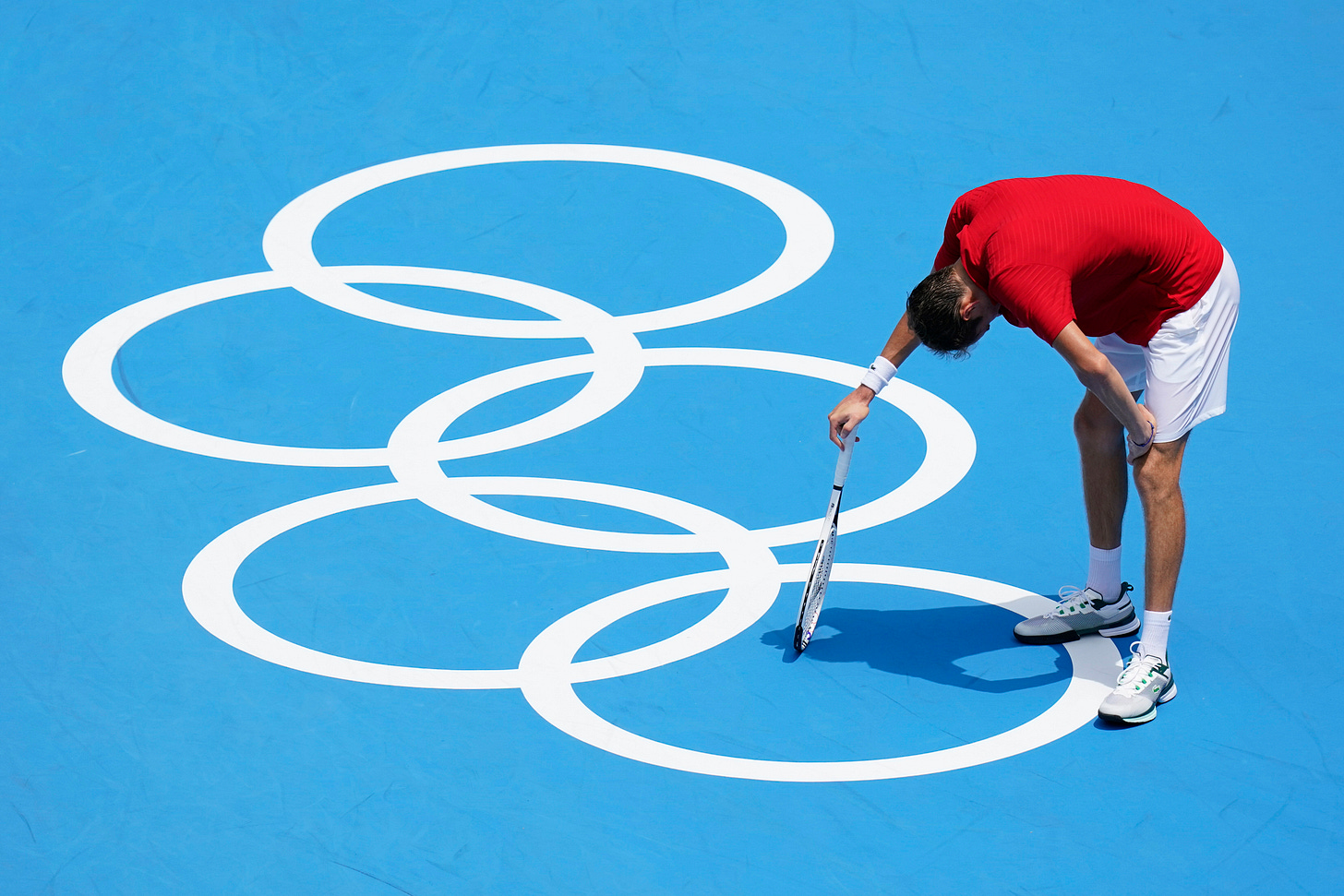
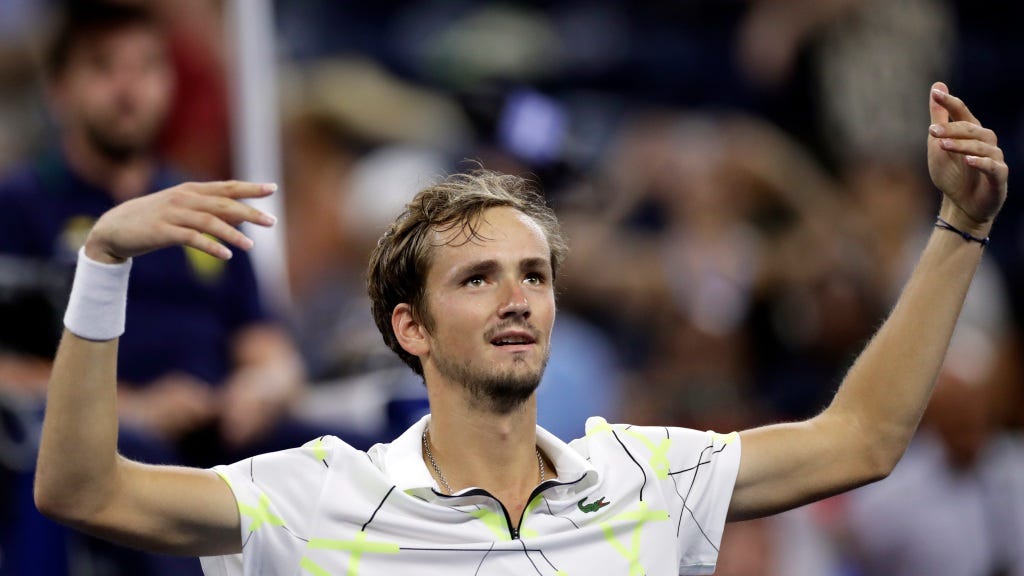
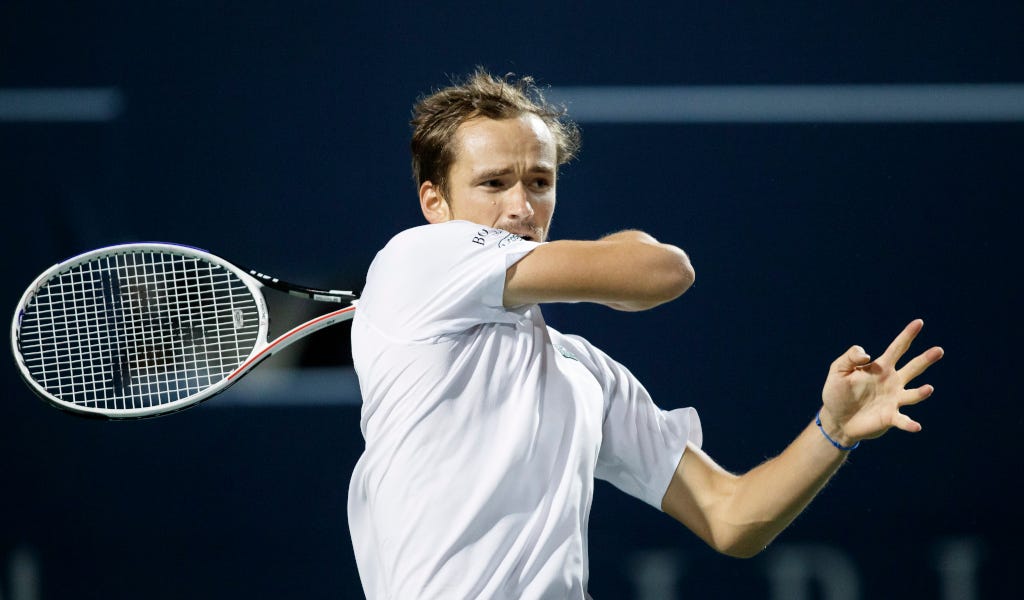

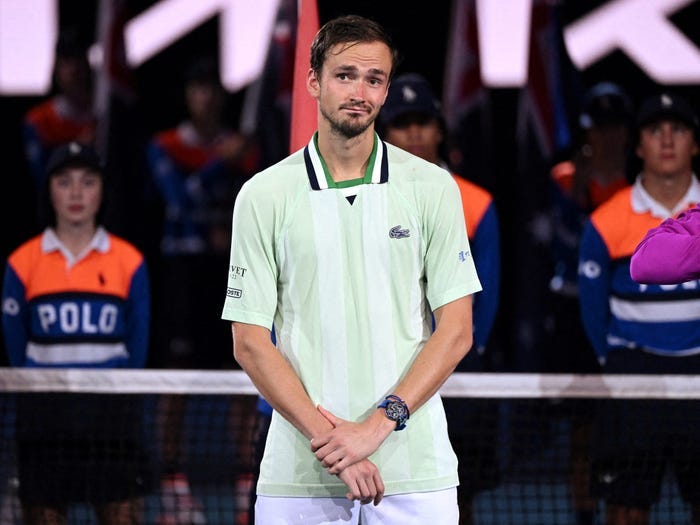
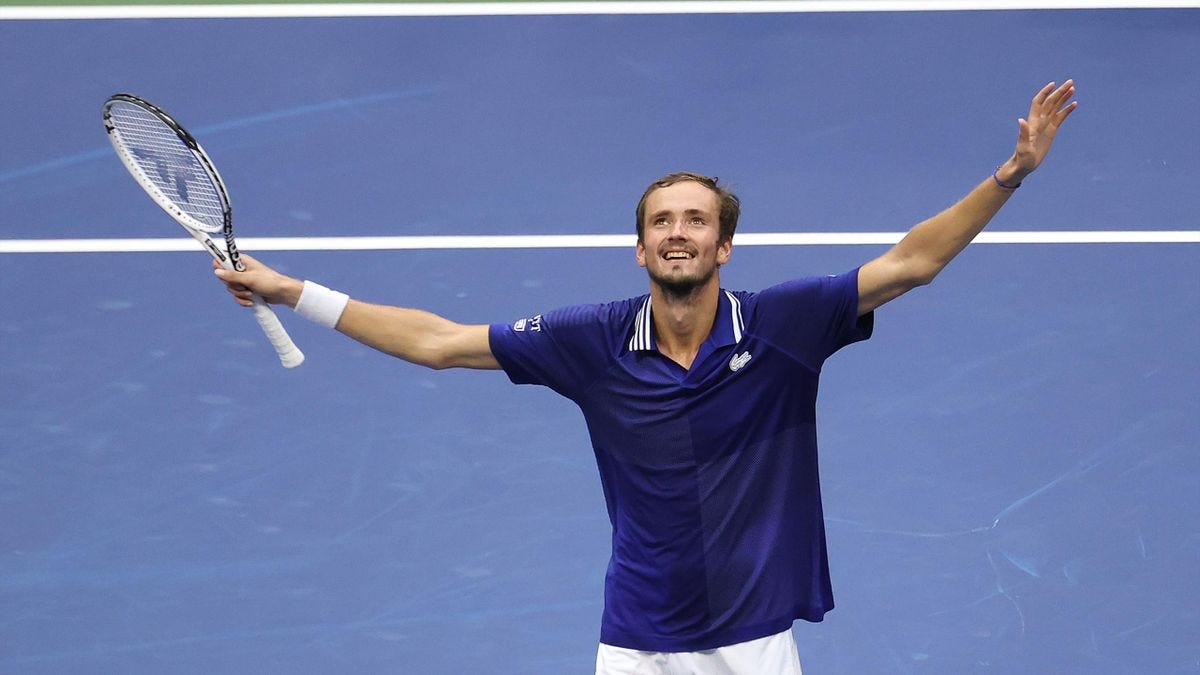
I feel like you wrote this after interviewing me! As I read it I was like, yes, YES, YESSSSS! 100% ME!! Trying to articulate my passion for Meddy, and how ot came out of nowhere! The personal crash/Burn after AO!!!! Etc, etc, ... So relatable!! Well done girl and thank you, thank you!!!!
OMG. It was such a beautiful piece Maya. Reading it again.